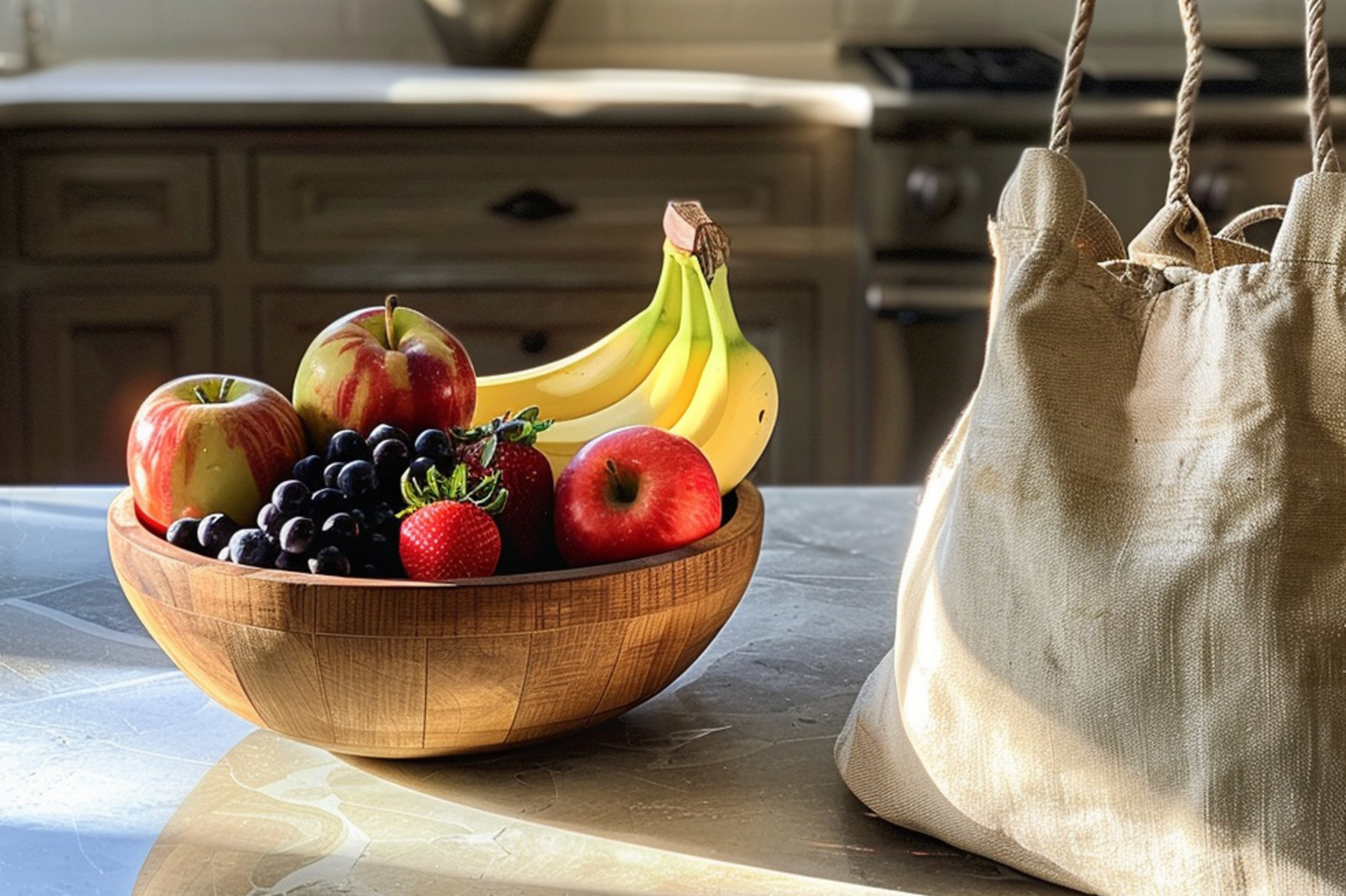We’ve all been there: you’re snacking on some fruit, and your dog looks up at you with their adorable puppy eyes, asking for a bite. Their cute gaze can be hard to resist — but be careful what you share with them.
Fruits can be a healthy snack for puppies, but not all are safe for canine consumption. Some fruits are higher in sugar content than others, which can cause problems like stomach upset and diarrhea. Others can even be toxic, and dangerous to your puppy’s health.
In this guide, we’ll take you through which fruits puppies can eat — and which ones they can’t. Plus, we’ll offer some serving suggestions to help you keep your fruit-loving pup healthy and happy.
Can Puppies Have Fruit?
Dogs are omnivores, which means their diets should include both meat and plant-based foods. However, if you feed your puppy a complete and balanced dog food, that food alone should contain all of the nutrients your pup needs to thrive. No extra fruits or veggies should be needed in their daily diet.
That being said, fruits can make a wonderful, special treat for your puppy. Just remember: the “five a day” rule doesn’t apply to dogs, so you should only give your pup fruit in moderation. Think of it as an occasional treat rather than a daily part of their diet, due to the high sugar content of some fruits.
It’s also important to reiterate that while dogs can safely eat some fruits, others are toxic to them. We’ll get to a list of safe fruit for puppies later in this guide — keep reading for more info.
Is Fruit Good for My Puppy?
Fruit is rich in vitamins, minerals, antioxidants, and fiber. However, dogs have very different nutritional requirements than humans, so it’s important to know which fruits will benefit your puppy’s health, and which won’t.
Some fruits can benefit your puppy by:
- Strengthening their immune system
- Reducing inflammation
- Aiding in digestion
- Improving their skin and coat
Superfoods like blueberries and pumpkin offer your puppy a concentrated source of antioxidants and essential nutrients, supporting their immune system and general well-being. This makes them excellent fruits for puppies. We’ll dive deeper into these fruits, and other fruits puppies can eat in the following section.
Which Fruits Can My Puppy Eat?
There are many different fruits that puppies can safely eat — but they should only be given to them occasionally, and in very small quantities.
Make sure that any fruit or vegetable you give your pup is plain, cut into bite-sized pieces, and free from pits or seeds to avoid choking. Also, avoid giving them dried fruit, as it tends to be higher in sugar and may contain chemicals that can be harmful to dogs.
Here are some of our favorite fruits puppies can eat:
Apples
Apples are great for puppies because they are chock-full of vitamin C, calcium, phosphorus, and fiber. Just make sure to remove the seeds, as they can contain small amounts of cyanide. Cut the apple into small pieces to make it easier for your little buddy to chew and digest it, then offer them this crisp, healthy, and refreshing treat.
Jinx Beef Bone Broth Biscuits and Chicken Bone Broth Biscuits are made with apples, blueberries, and other vitamin-rich superfoods to both support your pup’s health and please their palate.
Bananas
Bananas are rich in potassium, biotin, and vitamins for your puppy — however, they’re also pretty high in sugar, so only give them small amounts.
While banana can be a tail-wagging sweet treat for your puppy, banana peels are difficult to digest and might cause intestinal blockage. If your puppy does eat a banana peel, don’t panic right away. Just keep an eye on them, and go to the vet if you see any signs of distress.
Jinx Beef Training Treats and Chicken Training Treats are formulated with banana to support healthy digestion — but also because the touch of sweetness creates an irresistible flavor that your puppy will love.
Pumpkin
Pumpkin is high in fiber and supports healthy digestion, which is why it’s one of the key ingredients in Jinx Chicken and Pumpkin Puppy Meal Topper. You’ll also find pumpkin in our Salmon Jerky Tenders and Salmon & Pumpkin Topper.
As long as there are no additives, your puppy can have pumpkin as an occasional treat. Just avoid raw pumpkin, as it can be hard for them to digest. That being said, cooked pumpkin makes a great treat for your puppy — unsweetened pumpkin puree, canned pumpkin, or baked pumpkin are all delicious and nutritious options. When your pup has an upset stomach, you can even add canned pumpkin to their meals to help soothe their tummy troubles.
Blueberries
Blueberries are a superfood that’s rich in antioxidants (which can help prevent cell damage) and fiber. Plus, they already come in bite sized pieces, making them a perfect treat for hungry pups. Because blueberries can be so beneficial to your puppy’s immune system and overall health, we use them in some of our Jinx premium dog products.
Strawberries
Rich in vitamin C and antioxidants, strawberries can help strengthen your puppy’s immune system, making them a tasty and nutritious treat. One thing to note is that strawberries are also high in sugar — so be sure to only give them to your pup in moderation. They may cause an allergic reaction in some dogs, so try giving your puppy a very small amount at first to see how they react.
What Other Fruits Are Safe For My Puppy To Eat?
Besides those listed above, other safe fruits for puppies include:
- Cantaloupe
- Cranberries
- Cucumbers
- Mangos
- Oranges
- Peaches
- Pears
- Pineapple
- Raspberries
- Watermelon
What Fruits Are Not Safe For My Puppy?
While there are many safe fruits for puppies, there are also some that you should avoid feeding your dog. These include:
- Avocado: The pit, skin, and leaves contain persin, which is toxic to dogs. The fleshy part of avocados does not contain as much persin, and can be given to your puppy in small amounts (although some dogs don’t tolerate any amount of avocado — so it’s probably best to avoid it entirely).
- Tomatoes: Ripe, red tomatoes are okay to feed to your puppy, but never give them unripe, green tomato, or tomato stems or leaves. These contain solanine, which is toxic to dogs. Also, some dogs can’t tolerate the acidity in tomatoes, so there’s the potential for an upset stomach there.
- Citrus fruits: While not toxic to dogs, citrus fruits like lemons, limes and grapefruits can cause your puppy to have tummy troubles (and you don’t want a sick pup on your hands!)
- Pitted fruits: In general, always remove the pits and seeds from any fruit that you give to your puppy, to avoid a choking hazard.
- Grapes/Raisins: Grapes and raisins are extremely toxic to dogs, and can cause acute kidney failure — never feed these to your puppy.
- Rhubarb: Rhubarb leaves contain oxalic acid, which can be toxic to dogs if ingested in large amounts.
- Cherries: Cherry pits and stems can cause intestinal blockage, and the pit is also extremely toxic to dogs. It’s best to skip these.
How Much Fruit Should I Give My Puppy?
Before giving your puppy anything besides their regular daily meals, it’s important to keep portion sizes in mind. Whether it’s fruit or dog treats, moderation is key. Treats of any kind should make up no more than 10% of your dog’s diet to prevent overfeeding and potential health problems, So, no matter how cute your puppy looks when they’re begging for your apple, be sure to keep portion sizes small, and treat frequency occasional.
Can I Feed My Puppy Vegetables?
Some vegetables are safe in moderation for puppies, while others should be totally off-limits. At Jinx, we include sweet potato in our Puppy Kibble and Dental Chews to support healthy digestion, as well as carrots in our Wet Dog Food since they’re high in antioxidants.
Introducing Fruit Carefully
So, what fruits can puppies eat? Here are a few key things to consider before you start expanding your pup’s diet:
- Fruits can offer a number of health benefits for dogs — from a stronger immune system to a shinier coat. Just be sure to avoid fruits that are dangerous or toxic for them, like grapes, raisins, and dried fruits.
- Remove any pits or seeds that can be choking hazards or cause intestinal blockage if ingested.
- The skins of some fruits, like avocado, are toxic to dogs — so double check before treating your pup.
- Only feed your puppy fruit in moderate amounts — especially at the beginning — so their digestive system has a chance to adapt to it.
- Some fruits can cause allergies, so be sure to read up on dog food allergies to identify any signs of allergies in your dog.
- If you notice anything out of the ordinary after your dog has eaten fruit, contact your vet.
At Jinx, we're here to upgrade the way you care for your dog by providing holistic nutrition made with thoughtful formulation, real ingredients, and a whole lot of love. Get started with the Puppy Essentials Pack.

